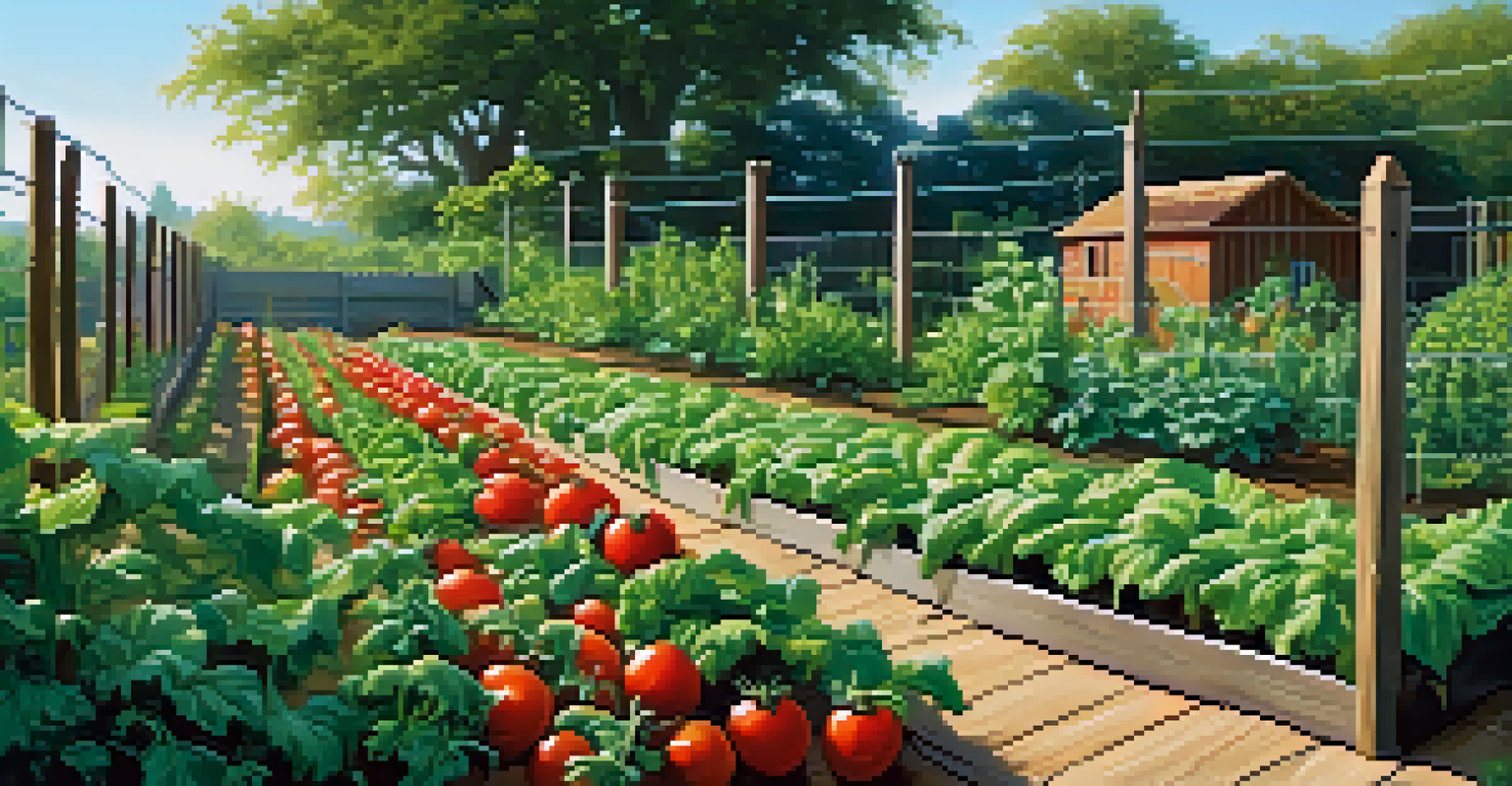Reducing Pesticide Exposure with Organic Vegetarian Choices

Understanding Pesticide Exposure and Its Risks
Pesticides are chemicals used in agriculture to protect crops from pests, but they can also pose health risks to humans. Exposure to these substances has been linked to various health issues, including respiratory problems and even some cancers. Understanding how these chemicals enter our bodies is crucial, as we often consume them through the food we eat.
The health of our soil, water, and air is not just a matter of personal concern; it's a global responsibility.
Many fruits and vegetables are treated with pesticides, and while washing can reduce some residue, it doesn’t eliminate it completely. This is where organic options come into play. Organic farming practices typically avoid synthetic pesticides, making organic produce a safer choice for health-conscious consumers.
By choosing organic vegetarian options, you can significantly decrease your exposure to harmful pesticides. This choice not only benefits your health but also supports sustainable farming practices that are kinder to the environment.
The Benefits of Organic Foods for Your Health
Organic foods are grown without synthetic fertilizers and pesticides, which means you’re consuming fewer chemicals. Research has shown that organic produce can have higher nutrient levels compared to conventionally grown foods. For instance, studies indicate that organic fruits and vegetables may contain more antioxidants, which are beneficial for overall health.

Opting for organic vegetarian options means you’re not just avoiding harmful chemicals; you’re also choosing foods that are often fresher and more flavorful. The taste difference can be quite noticeable, making your meals more enjoyable. Freshness matters, especially when it comes to fruits and vegetables, as they tend to retain more nutrients when they haven’t been stored for long periods.
Health Benefits of Organic Foods
Choosing organic foods can significantly reduce your exposure to harmful pesticides and provide higher nutrient levels.
Moreover, many organic farms prioritize biodiversity and sustainability. By supporting organic agriculture, you're contributing to a healthier planet, which in turn fosters a healthier you.
Navigating the World of Organic Labels
When shopping for organic products, it’s important to know what different labels mean. The USDA Organic seal indicates that the product is made with at least 95% organic ingredients, ensuring you’re getting the real deal. However, terms like 'natural' or 'made with organic ingredients' can be misleading, as they don’t always meet the same standards.
You are what you eat, so don’t be fast, cheap, easy, or fake.
Familiarizing yourself with these labels can help you make informed choices and avoid products that don't fully align with your health goals. Always check the packaging for additional certifications to ensure that the product meets your expectations for organic quality. If you’re ever in doubt, doing a little research on brands can go a long way.
Remember, prioritizing organic doesn’t have to break the bank. Many stores offer bulk organic options, and local farmers’ markets can be a great place to find fresh, organic produce at reasonable prices.
Incorporating Organic Vegetarian Choices into Your Diet
Transitioning to an organic vegetarian lifestyle can be both exciting and rewarding. Start by swapping out a few conventional items in your grocery list for organic alternatives. For instance, if you typically buy apples, consider purchasing organic apples instead to reduce your pesticide exposure while enjoying a delicious snack.
Meal planning can also help you incorporate more organic produce into your daily routine. Set aside some time each week to plan meals using organic ingredients, which can help streamline your shopping experience. Engaging with seasonal produce not only enhances the flavors but also supports local farmers.
Impact of Organic Farming
Organic farming practices promote environmental sustainability by prioritizing soil health and biodiversity.
Experimenting with new recipes can make the transition enjoyable. Discovering new ways to prepare organic vegetables can reinvigorate your meals and encourage you to explore the vast variety of options available.
The Impact of Organic Farming on the Environment
Choosing organic vegetarian foods is not just a personal health decision; it also has a positive impact on the environment. Organic farming practices often prioritize soil health, water conservation, and biodiversity. By avoiding synthetic pesticides and fertilizers, organic farmers help protect the ecosystems surrounding their farms.
This choice can lead to healthier soil, which plays a crucial role in growing nutrient-rich crops. Healthier soil can store more carbon, thus contributing to the fight against climate change. In essence, by going organic, you’re not only supporting your health but also contributing to a sustainable future.
Additionally, organic farms tend to use crop rotation and other techniques that naturally manage pests and enhance soil fertility. This holistic approach fosters a balanced ecosystem that benefits both the environment and consumers.
Addressing Common Myths About Organic Foods
Despite the growing popularity of organic foods, several myths still persist. One common misconception is that organic foods are always more expensive than conventional options. While some organic products can be pricier, there are many affordable organic choices available, especially when purchased in bulk or at local markets.
Another myth is that organic foods are not as accessible as conventional ones. With an increasing number of grocery stores and online retailers offering organic options, it’s becoming easier than ever to find these foods. In fact, many supermarkets now have dedicated organic sections, making it convenient to shop for healthier choices.
Support Local Organic Farmers
Shopping at local farmers' markets not only ensures fresh produce but also strengthens the community and economy.
Finally, some people believe that organic foods aren’t as effective in combating pests or diseases. In reality, organic farming employs various natural methods to maintain crop health, proving that it is possible to grow food sustainably without relying on synthetic chemicals.
Supporting Local Organic Farmers for Better Choices
One of the best ways to ensure that you’re getting high-quality organic produce is to support local farmers. By shopping at farmers’ markets or joining a community-supported agriculture (CSA) program, you can get fresh, organic vegetables directly from those who grow them. This not only reduces the carbon footprint associated with transporting food but also fosters a connection with your local community.
Local organic farmers often use sustainable practices and are more likely to engage in environmentally friendly methods. They are passionate about their products and can provide insights into how your food is grown. Plus, you might discover unique varieties that you wouldn’t find in conventional grocery stores.

Supporting local farmers strengthens the local economy and encourages more people to consider organic farming. This community connection can lead to a more sustainable food system, ultimately benefiting everyone involved.